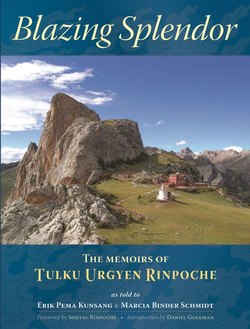Читать книгу Blazing Splendor - Tulku Urgyen Rinpoche - Страница 23
На сайте Литреса книга снята с продажи.
Оглавление10
My Guru, Samten Gyatso
My grandmother’s eldest son, Samten Gyatso, was my root guru and ultimate refuge. He was also, of course, my uncle. I feel a bit shy telling stories about him, because I don’t want to sound as if I’m indirectly praising myself by lauding a family member. A disciple who emphasizes signs of accomplishment, clairvoyant abilities and miraculous powers in stories about his own guru, may—instead of honoring him—end up discrediting him. Yet though he was a relative, there is no way I can avoid praising him. I don’t mean to be crude, but I’m related to him like excrement is related to fine cuisine.
I’m not just glorifying someone in my own family, like “the lower lip praising the upper,” but, in all honesty, there was virtually no other master in Kham with such a high view and realization, with such commanding presence and majestic brilliance. I won’t be able to tell you the inner or innermost versions of his life—as we customarily describe a person’s spiritual experiences and realization—since I don’t know them. But here is what I have heard or directly witnessed.
When Samten Gyatso transmitted the New Treasures to the great master Tentrul at Surmang monastery, I slept near the door in Samten Gyatso’s room, so I often witnessed their evening discussions. Tentrul was extremely learned and very noble. One day, he told me, “Many years ago I met Samten Gyatso with your father, Chimey Dorje, in Derge, and even then I thought that due to his insight and lineage he would become a truly great scholar. I have studied many more philosophical works than Samten Gyatso, but when we get to the topic of the Great Perfection, I almost don’t dare to continue speaking. When we discuss the New Treasures, somehow I am able to keep up, but he puts me to shame when we start talking about meditation.”
Within the Barom Kagyu lineage, Samten Gyatso was regarded as an emanation of Four-Armed Mahakala, one of the more prominent guardians of the Dharma.84 Moreover, the second Chokling of Tsikey once had a vision of Samten Gyatso in which he saw him as an emanation of Vimalamitra.
From the time I was young, I respected my guru deeply. In his conduct, Samten Gyatso kept the monastic precepts quite purely and strictly. He never tasted alcohol nor ate any meat. In his attitude, he was always in tune with the bodhisattva trainings.
Some of us who were with him every day could be quite blind to his qualities, just like people in Lhasa who never go to see the Jowo statue of the Buddha, thinking there is plenty of time to get around to going. But if you paid attention to his personality, it was obvious that he was fully endowed with compassion, perseverance and devotion.
Samten Gyatso never flattered others by playing up to them or telling them how wonderful they were. He spoke straightforwardly. If something was true, he would say so; if not, he would say it was not, without adding or subtracting anything. He never talked around a sensitive topic.
My guru was completely reliable, conscientious in all matters. If you got his word on something, you would never hear him say later that he had forgotten. That’s the kind of man he was, extremely dependable. He was almost never sick—or at least I never heard him complain, not even about having a headache or some other pain. Nor did he ever make plans for more than one day at a time and he always completed his tasks.
Samten Gyatso was scrupulously attentive to all his daily affairs, both spiritual and secular. For instance, when giving empowerments, he never skipped a word or phrase. He would perform the entire ritual, from the preparation to the concluding verses, in a state of meditative composure, so that upon entering the room you got the feeling that you were about to receive an empowerment for real. That’s the kind of teacher he was.
Other people were intimidated by Samten Gyatso’s meticulousness and, afraid of not living up to his standards, often felt unqualified to participate in rituals in his presence. You couldn’t make a single mistake on a torma or leave out a single detail in a mandala arrangement on the shrine, because you somehow knew that he would not only detect it but find it unacceptable. You would be hard-pressed to find anyone more thorough—he was a true perfectionist! Novice lamas didn’t dare put on airs when he presided over a ceremony.
Samten Gyatso was so learned and skilled, so trustworthy and matchless, that people compared him to Marpa, the master translator who brought the Kagyu teachings from India.
Yet my guru never postured nor put on the air of high realization, like those meditators who never lower their vacant, glaring gaze to the ground and who spout random “profound” statements such as “Everything in samsara and nirvana are equal!” What do you gain from such pretense?
Samten Gyatso would move about as if he were just an ordinary person. He kept to the hidden yogi style: he didn’t flaunt his accomplishments and never behaved as if he were a grand lama. He would not bless people by placing his hand on their heads nor sit on a high seat. He didn’t even let people bow to him—if anyone tried, he would jump up and move away. He avoided ostentatious displays like erecting impressive temples or commissioning fancy statues. He kept a low profile: he never dressed up or wore brocade, but just the robes of an ordinary monk.
